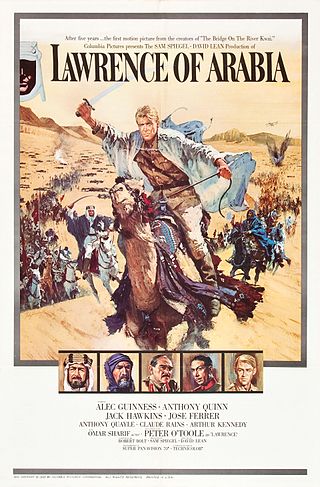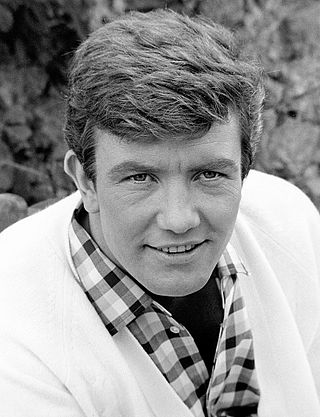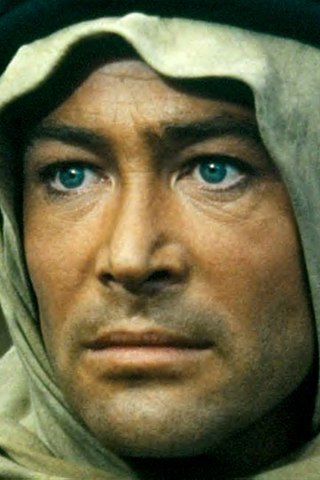
Lawrence of Arabia is a 1962 British epic historical drama film based on the life of T. E. Lawrence and his 1926 book Seven Pillars of Wisdom. It was directed by David Lean and produced by Sam Spiegel, through his British company Horizon Pictures and distributed by Columbia Pictures. The film stars Peter O'Toole as Lawrence with Alec Guinness playing Prince Faisal. The film also stars Jack Hawkins, Anthony Quinn, Omar Sharif, Anthony Quayle, Claude Rains and Arthur Kennedy. The screenplay was written by Robert Bolt and Michael Wilson.

Albert Finney was an English actor. He attended the Royal Academy of Dramatic Art and worked in the theatre before attaining prominence on screen in the early 1960s, debuting with The Entertainer (1960), directed by Tony Richardson, who had previously directed him in the theatre. He maintained a successful career in theatre, film and television.

Peter Seamus O'Toole was a British stage and film actor. He attended the Royal Academy of Dramatic Art and began working in the theatre, gaining recognition as a Shakespearean actor at the Bristol Old Vic and with the English Stage Company. In 1959 he made his West End debut in The Long and the Short and the Tall, and played the title role in Hamlet in the National Theatre's first production in 1963. Excelling on the London stage, O'Toole was known for his "hellraiser" lifestyle off it.

Dame Margaret Natalie Smith is an English actress. With an extensive career on screen and stage beginning in the mid-1950s, Smith has appeared in more than sixty films and seventy plays. She is one of the few performers to achieve the Triple Crown of Acting, having received highest achievement for film, television and theatre, winning two Academy Awards, a Tony Award and four Primetime Emmy Awards. Hailed as one of Britain's most recognisable and prolific actresses, she was made a Dame by Queen Elizabeth II in 1990 for contributions to the Arts, and a Companion of Honour in 2014 for services to Drama.
The year 1962 in film involved some very significant events, with Lawrence of Arabia winning seven Academy Awards including Best Picture and Best Director.

Thelma Ritter was an American actress. Known as a character actor with a strong New York accent, she took working-class roles. She received a Tony Award and six Academy award nominations, more than any other actress in the category.
The 61st National Board of Review Awards, honoring the best in filmmaking in 1989, were announced on 13 December 1989 and given on 26 February 1990.
The 35th Academy Awards, honoring the best in film for 1962, were held on April 8, 1963, at the Santa Monica Civic Auditorium in Santa Monica, California, hosted by Frank Sinatra.
The 34th Academy Awards, honoring the best in film for 1961, were held on April 9, 1962, hosted by Bob Hope at the Santa Monica Civic Auditorium in Santa Monica, California.

Norman Rossington was an English actor best remembered for his roles in The Army Game, the Carry On films and the Beatles' film A Hard Day's Night.

Long Day's Journey into Night is a 1962 American drama film directed by Sidney Lumet, adapted from Eugene O'Neill's Pulitzer-winning play of the same name. It stars Katharine Hepburn, Ralph Richardson, Jason Robards, and Dean Stockwell. The story deals with themes of addiction and the resulting dysfunction of the nuclear family, and is drawn from O'Neill's own experiences. It was shot at Chelsea Studios in New York, with exteriors filmed on City Island.
The 20th Golden Globe Awards, honoring the best in film and television for 1962, were held on March 5, 1963.
The 33rd National Board of Review Awards were announced on December 19, 1961.
The Miracle Worker is a 1962 American biographical film about Anne Sullivan, blind tutor to Helen Keller, directed by Arthur Penn. The screenplay by William Gibson is based on his 1959 play of the same title, which originated as a 1957 broadcast of the television anthology series Playhouse 90. Gibson's secondary source material was The Story of My Life, the 1903 autobiography of Helen Keller.
The 55th National Board of Review Awards were announced on December 14, 1983.
Long Day's Journey into Night is a film by Canadian director David Wellington, released in 1996. An adaptation of Eugene O'Neill's 1956 play Long Day's Journey into Night, the film starred William Hutt as James, Martha Henry as Mary, Peter Donaldson as Jamie, Tom McCamus as Edmund and Martha Burns as Cathleen.
An Oscar speech is a public monologue given by a person who has just been awarded an Academy Award, an annual accolade given by the Academy of Motion Picture Arts and Sciences to honor cinematic achievements in the film industry. Though speeches are common for award ceremonies, it is a particularly significant feature of the Academy Awards due to their worldwide audience and history of featuring prominent celebrities.
Bachsas Awards was introduced in 1972 to encourage the fledgling film industry of the country. Bangladesh Cholochchitra Shangbadik Samity gave out their most prestigious awards to outstanding performers in film, television, music, dance and theatre.